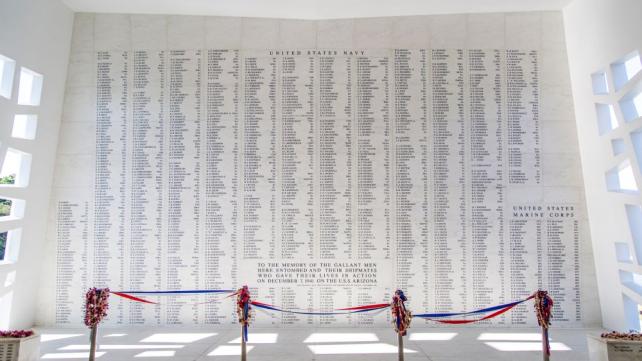
On December 8, 1941, the day after the attack on Naval Station Pearl Harbor Military Base by the Japanese military, President Franklin Delano Roosevelt (FDR) made the famous statement declaring December 7, 1941, as a ‘date which will live in infamy.”.
The bombing of the naval station at Pearl Harbor brought the United States fully into World War II and began the extreme xenophobic response that resulted in immediate retribution. The same day of the attack, the FBI arrested about 1,300 Japanese Americans without evidence or cause. Then, Executive Order 9066 would be the justification for forcibly confining over 122,000 Japanese Americans in what was known as ‘internment camps”.
The attack on Pearl Harbor and the resulting racist discrimination was a product of political expedience, hysteria, racial scapegoating, ethnic economic resentment, and a collective willingness to disregard civil liberties to placate public fear.
These five reactions were not a new response, but an update to a historical norm. Jim Crow laws after the slaves were freed were born out of fear of “Black” retribution for slavery, which prompted a suppression of civil rights and denial of economic solvency. Native American resistance to white settlement in the western states of the United States was the backdrop that forced the Trail of Tears and the Indian Removal Act of 1830. Even after the events of 9/11, the internment of suspects at Guantanamo Bay Prison was a way to be politically expedient in showing strength against the attackers and pacifying the public that those responsible were being duly punished.
In all instances, economic oppression played a substantive part in the discrimination. Immigrants from Europe could not compete with ‘free’ labor during slavery. Although 100 percent of the enslaved Americans were forced to work during the institution of slavery, freed African-Americans struggled to find work and were often denied employment opportunities. Native Americans attempts at economic solvency were stymied by forced internment on barren reservations. Countries deemed sympathetic to terrorist activities after the events of 9/11 were subjected to economic sanctions and embargoes.
Although the United States was formed by voluntary and involuntary immigration from all over the world, there is a great deal of economic resentment of immigrants. Historically, people often examine the events of Japanese internment as retribution for the attack on Pearl Harbor, but it was much more nuanced and dangerous. The Japanese that were interned in camps after the attack were victims of racial economic antagonism. The combination of accusing all Japanese of disloyalty to the U.S. and adopting the term “yellow peril” to describe them, helped the white farmers of the western United States to influence politicians to suppress the Japanese. Records show that in 1940, nearly 45% of employed Japanese-Americans in the West Coast states were farmers. History documents that farmers in the West were worried and resentful of that much Japanese power. This was exacerbated by the fact that the Japanese were very successful at growing crops that the American farmers hadn’t even considered. The white farmers complained about Japanese loyalty and intention and politicians found it politically expedient to demonstrate how they were punishing Japanese.
Economic oppression has always been an effective weapon against minorities in history. Even when we view Arab society over fifteen centuries ago, the backdrop for the “Hilf al-Fadul” Meccan alliance lay in economics. At the time, a merchant from the tribe of Zubaid came to Makkah to conduct business and sell his wares. Unfortunately, a member of the stronger tribe of Quraysh took his merchandise and refused to pay him. This man knew there would be no retribution for this act because Meccan society favored the strong. This stranger sought assistance from the leaders of Makkah and was initially unsuccessful. Eventually, a powerful Meccan heard his plea and convinced other powerful leaders in Makkah to form this pact that worked against economic discrimination.
The “Hilful-Fudul” alliance in 590 in Makkah basically ordered Arabs to uphold justice for everyone, especially those who did not have the protection of a clan. The agreement required collective action of the tribes to enforce the pact.
When speaking on events of the pact, the Prophet Muhammad, God’s peace and blessings be upon him, was reported to have said:
"I witnessed a treaty at the home of Abdullah bin Jud’aan. If I am asked to attend such meeting now, I would answer."
[Sunan Al-Bayhaqi AlKubra: 12859]
Although this agreement was made before he received his first revelation, it was a pact that the Prophet acknowledged and upheld as a valid principle that Muslims embrace and sustain, since it involved defending the vulnerable, oppressed and those discriminated against.
We can observe in modern times how when a whole ethnic group is characterized as a problem or takes the blame for what others have done, the resulting hysteria from the public makes economic oppression more palatable. The 2023 war between Israel and Hamas demonstrated efforts of economic devastation. The egregious bombings destroyed homes, businesses,and infrastructure needed for a viable society. This is in addition to the killing of innocent civilians who are scapegoated as sympathetic partners to Hamas, reminiscent of suspicion of Japanese-Americans,
As Muslims, we are tasked to speak out and work against oppression. Each year Americans observe Pearl Harbor Remembrance Day on December 7th, but this “infamous” day is not just a day to note, but rather a day to learn from. The lessons of the results of public hysteria are valuable in developing proactive strategies for effective civic engagement that decreases the propensity towards oppression and injustice.



Add new comment